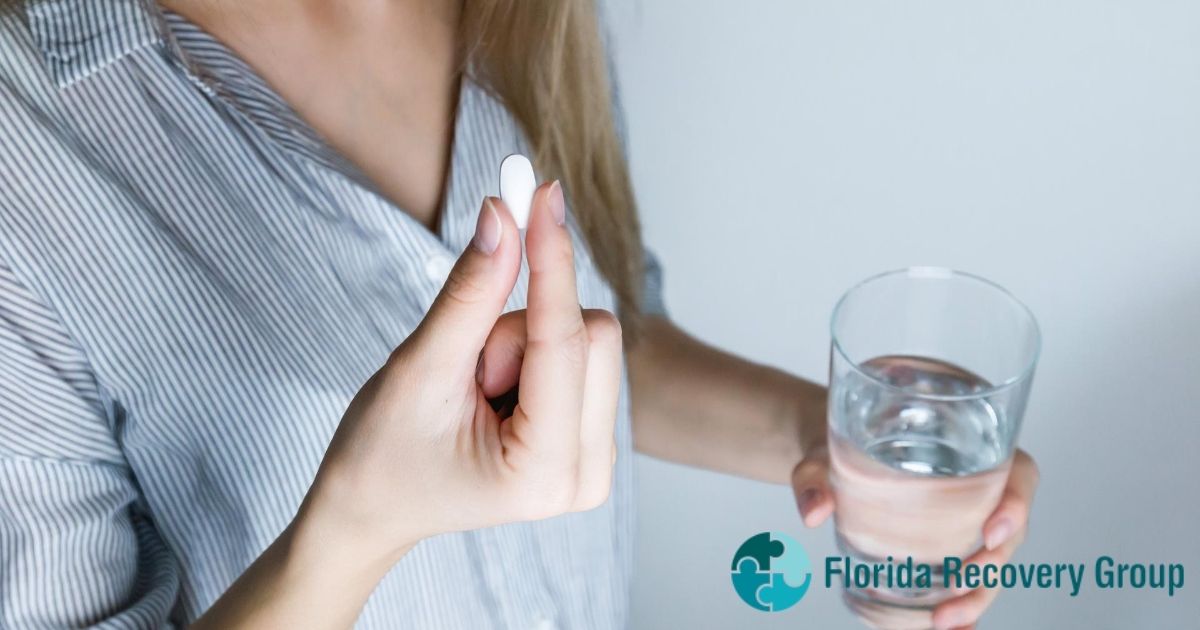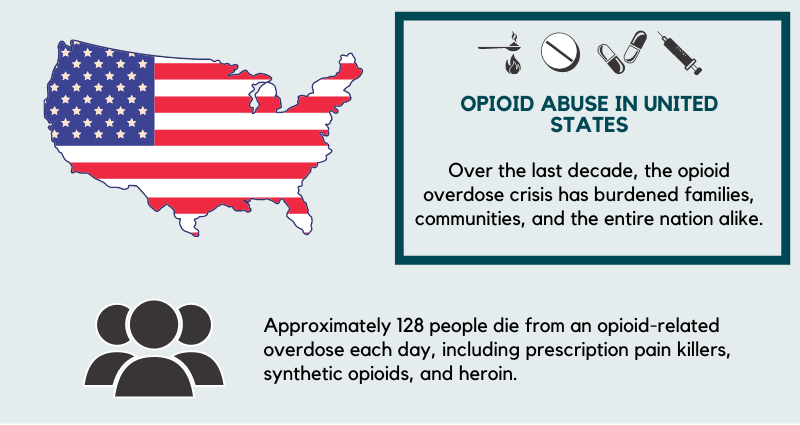
28 Aug Signs of Opioid Abuse and Addiction
Opioids are some of the most addictive drugs in the world and millions of prescriptions are written for them each and every year. In fact, in 2018 there were nearly 51.4 opioid prescriptions written for every 100 Americans.[1] Since addiction can develop rapidly, it’s important to be able to spot the signs of opioid abuse and addiction.
Opioid Abuse in the United States
Over the last decade, the opioid overdose crisis has burdened families, communities, and the entire nation alike. Approximately 128 people die from an opioid-related overdose each day, including prescription pain killers, synthetic opioids, and heroin. Furthermore, the Centers for Disease Control and Prevention (CDC) estimates that the economic burden of prescription opioid abuse alone comes out to $78.5 billion each year.

Opioid misuse is so concerning that numerous doctors and pharmaceutical companies have been under fire for overprescribing practices and misinformative medicinal claims. To explain, between 21-29% of people who are prescribed opioids abuse their prescription, and between 8-12% ultimately develop an opioid use disorder. Moreover, an estimated 4-6% of people who abuse opioids transition to heroin, and up to 80% of people who are addicted to heroin abused prescription opioids first.[2] As a result, it is clear that prescription opioid abuse is a major public health concern.
When it comes to opioid misuse in the United States, Florida is no exception. In fact, in 2018, opioids were involved in nearly 70% of all drug overdose deaths. Furthermore, Florida medical providers wrote approximately 53.7 opioid prescriptions for every 100 persons, which is higher than the national average. Sadly, Delray Beach and South Florida are at the epicenter of the state’s opioid crisis.
Signs That Someone is Abusing Opioids
It isn’t always easy to spot opioid abuse in it’s early stages, however, once a person becomes addicted, it will be easier to spot. That being said, spotting opioid misuse early is vital as it can help people seek treatment sooner. Some people are more prone to opioid addiction than others. The following are considered risk factors for opioid addiction:
- Living under stressful circumstances such as unemployment, poverty, or homelessness
- Younger in age, such as teens or early 20s
- People with a personal or family history of substance abuse
- History of behavioral problems such as issues at work, school, or social gatherings
- Being in frequent contact with drug users or environments with drug use
- People who struggle with depression, anxiety, or other mental health conditions
- Using tobacco heavily
- People who engage in risk-taking, thrill-seeking, or illegal behavior
- Having a parent who suffers from opioid addiction
- Growing up in a home where drug use is common
- Past trauma or PTSD
Ultimately, anyone who abuses opioids can become addicted to them regardless of their age, race, or socioeconomic status. Some common signs that someone is abusing opioids include:
- Taking opioids in a way that is not intended by the doctor (i.e. snorting, shooting, or taking a higher dose than instructed)
- Using opioids even when a person is not in pain
- Changes in sleep patterns
- Nodding off or seeming drowsy
- Pinpoint pupils
- Flushed skin and face
- Increased itching
- Constipation
- Slowed reaction times
- Mood swings
- Borrowing or stealing medication from loved ones
- Doctor shopping (going to multiple doctors to seek multiple prescriptions)
In most cases, long term opioid abuse ultimately progresses into physical and psychological dependence, or addiction.
Opioid Tolerance and Dependence
Opioids are highly addictive drugs that, when abused, have the potential to become physically and psychologically addictive. Even though they are used to treat pain, approximately 2.1 million people in the United States abuse opioids. When consumed, opioids attach themselves to the opioid receptors in the brain, gastrointestinal tract, and spinal cord. This sends messages throughout the body that create feelings of relaxation, pleasure, and slowed breathing or heart rate.
When taken over an extended period of time, the body becomes desensitized to the effects of opioids, so the body needs more of the drug to achieve the desired effects. For example, someone who was used to taking 15mg of Oxycodone may find themselves needing to take 30-45mg or more to get high. This is what addiction experts and physicians refer to as tolerance. Unfortunately, once people develop a tolerance, they may begin taking more and more opioids, exacerbating their opioid use problem.
As the body comes more and more used to having an excess of opioids in the body, it becomes dependent on the substance. This results in withdrawal symptoms if a person cuts back the amount they use or stops using altogether. In many cases, dependence occurs before people even realize they are addicted. Moreover, withdrawal symptoms are commonly mistaken for the cold or flu, so people continue to abuse opioids until their addiction is out of control.
Opioid Withdrawal Symptoms
Although opioid withdrawal is typically not life-threatening, it is extremely uncomfortable as best. In addition, several factors influence the duration and severity of withdrawal symptoms, including age, weight, opioid abuse history, and overall health. Symptoms typically begin within 24 hours of stopping use of the drug and may include:[3]
- Restlessness
- Anxiety
- Muscle aches
- Intense cravings
- Depression
- Teary eyes
- Yawning
- Runny nose
- Insomnia
- Diarrhea
- Abdominal cramping
- Goosebumps
- Sweating
- Nausea and vomiting
- Dilated pupils
- Rapid heart beat
- High blood pressure
People who experience withdrawal symptoms when they stop seeking opioids should seek help from a local drug detox center rather than trying to detox alone.
Symptoms of Opioid Use Disorder
Doctors and addiction specialists diagnose opioid misuse problems using the criteria set forth in the Diagnostic and Statistical Manual of Mental Disorders, fifth edition (DSM-V). Similarly, loved ones may use these criteria to help determine whether or not someone is addicted to opioids. To confirm an opioid use disorder or opioid addiction, a person must meet at least two of the following criteria within a 12-month period of time:[4]
- Taking opioids in larger amounts or for a longer period of time than intended
- Wanting to cut back or stop using but being unable to do so
- Spending an excessive amount of time obtaining opioids, using opioids, and recovering from the effects of opioid abuse
- Having strong cravings or desires to take opioids
- Opioid use results in failure to complete obligations at work, school, or home
- Continuing to use opioids despite problems at school, work, or home
- Neglecting responsibilities or recreational activities due to drug use
- Using opioids in dangerous or life-threatening situations
- Continuing to use opioids despite a worsening mental or physical health problem
- Development of a tolerance to opioids
- Experiencing withdrawal symptoms when opioids are not taken
In the end, opioid addiction is characterized by compulsive and irrational drug seeking behaviors. Someone who is addicted to opioids may lie to their loved ones about their drug use or fail to see how their behaviors are affecting the people around them. As a result, opioid addiction is a devastating and far-reaching condition that requires intensive treatment.
Opioid Abuse Treatment in Delray Beach
If you or a loved one are struggling with opioid abuse, our drug and alcohol rehab in Delray Beach, Florida is here to help. By providing our patients with comprehensive life skills, individualized care, and the highest quality services, we help people get back on their feet after addiction.
Opioid addiction is a deadly and progressive illness that rarely gets better without treatment. So, don’t wait any longer. Contact one of our dedicated addiction treatment providers today – recovery is closer than you think.
References:





